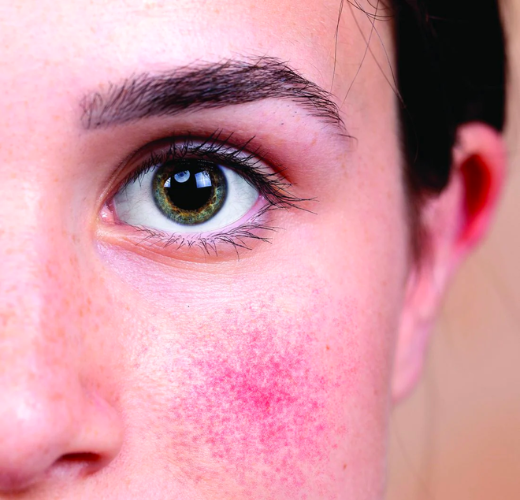How to Practice the Anti-Rosacea Lifestyle

If you have rosacea, you know full-well that preventing flare-ups can be a challenge. The ideal approach for managing this common skin condition involves steering clear of factors that can exacerbate rosacea and making small yet impactful lifestyle changes.
Avoid triggers
Every case of rosacea is different, and a trigger for one person may not be for another. Alcohol, spicy foods and hot drinks are a few of the most common rosacea triggers, but there are two specific groups of foods that have been linked to flare-ups. One is cinnamaldehyde-containing foods, such as tomatoes, citrus fruits and chocolate (sorry). You may also want to skip foods that contain histamines, and these include processed meats, aged cheeses and wine (again, sorry).
Eat right
Following an anti-inflammatory diet can help keep rosacea under control. Simply put, this means avoiding “inflammatory” foods like refined carbohydrates (think white bread, pasta, cookies and the like), fried foods, soda and other sugary drinks, red meat and unhealthy fats such as margarine.
You can probably guess the top inflammation-fighting foods… Fruits (especially strawberries, blueberries, cherries and oranges), green leafy vegetables, almonds and walnuts, olive oil, and fatty fish like salmon, mackerel and tuna.
Skincare
Rosacea patients (obviously) have very sensitive skin, which is why a top skincare priority is reinforcing the skin’s barrier with gentle products. Moisturizer is perhaps the most important skincare step for those with rosacea, and I recommend a rich formulation that includes ceramides, glycerin and urea. It’s also imperative to wear a mineral-based sunscreen that offers protection against blue light as well. (Our Sheer Joy Sunscreen SPF 50+ fits the bill.)
Exercise regularly
Although you may associate vigorous exercise with facial flushing (and this is often the case), a rosacea diagnosis doesn’t mean you have to avoid physical activity. In fact, the health consequences of inactivity are far worse than those associated with rosacea. Making modifications to your exercise routine can actually help minimize the frequency and severity of flare-ups. If you partake in activities that increase heart rate, respiration and blood flow, reduce the intensity or do them for shorter periods of time. If you exercise outdoors, do it at cooler times of the day. When working out indoors, use a fan, damp cloth or spray bottle to prevent your skin from overheating.


